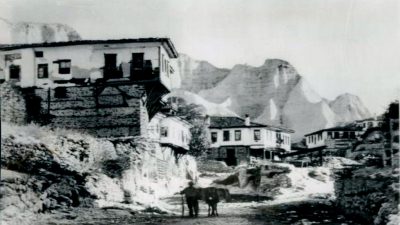The episode is dedicated to the historical community of Melnik, a place of exile of Byzantine princes and an impregnable fortress in the shadow of the mountains.
The Ottoman conquest of the Balkans in the 14th-15th centuries resulted in a long period of decline, but Melnik was once again a prosperous city in the 17th and 18th centuries, thanks to the production of tobacco and wine, which was exported, mainly to England and Austria. At that time, Melnik was also a center of artistry, especially ecclesiastical decoration and woodcarving. During this period, a unique text was produced, a model of the perception of the Greeks for the community administration, the “Constitution of the community of Melnik”.
The Greek inhabitants of Melnik participated in the Greek Revolution of 1821 with Anastasios Polyzoidis and the chieftain Dionysios Zanos as the main fighters, as well as in the Macedonian Revolution of 1878, insistently requesting weapons from the Greek consulate in Thessaloniki.
Meleniko was occupied by the Imperial Russian Army during the Russo-Turkish War of 1877–1878 but was returned to the Ottoman Empire under the Treaty of Berlin. The city was the center of a “kaza” in the sanjak of Serres in the Province of Thessaloniki as Meleniko until 1912. During the First Balkan War, the city was eventually incorporated into Bulgaria. In the late 18th century the city had 1,300 houses, 70 churches, and a population of 20,000 but a fire largely destroyed it.
When the Greeks were forced to leave their hometown, they opened the taps of the barrels with the wine so that it would not fall into the hands of the Bulgarians and it poured into the stone cobbled streets. It was the day when the “black diamond” of the Balkans or the “smallest city on earth” changed hands and cultural identity
Research – documentation – presentation: Thomas Sideris
